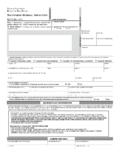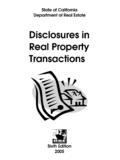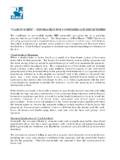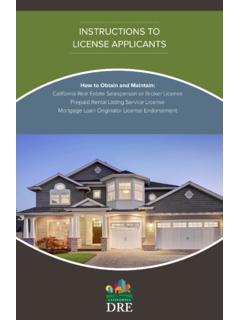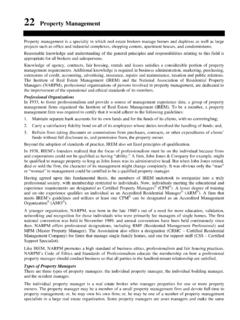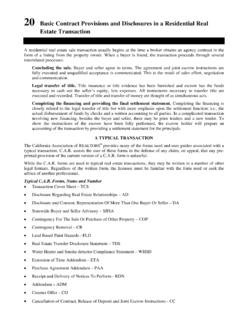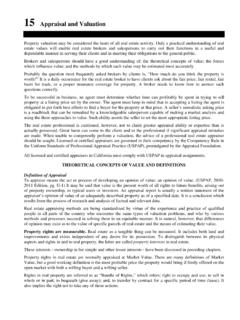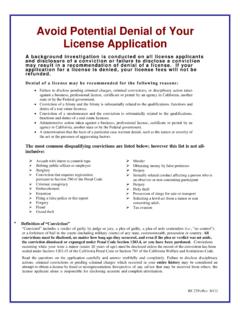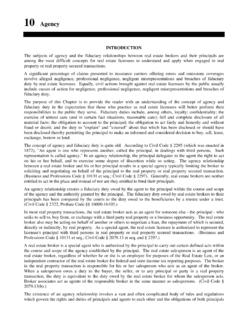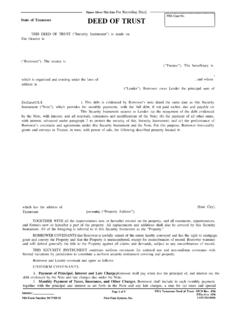Transcription of TRUST DEED INVESTME NTS HAT YOU SHOULD …
1 WH TRUINVWHAT YOUSERVINGB ureauUST DEVESTMEU SHOULDG CALIFORNIANS SIu OF REAL EEED ENTS D KNOWNCE 1917 ESTATE W !! WH TRUINVWHAT YOUEDMUNSta ANNA MBusinessand WACBureSERVINGB ureau(Revised byiUST DEVESTMEU SHOULDND G. BROWG overnorate of CaliforM. CABALLS ecretarys, Consumer Housing AgAYNE BELC ommissioneeau of Real ECALIFORINIANS SINu OF REAL E y CalBRE, MEED ENTS D KNOW WN, JR. rnia LERO Services, gency LL er Estate NCE 1917 ESTATE March 2014) W !! ii TRUST deed INVESTMENTS WHAT YOU SHOULD KNOW !! Originally Prepared by: PARKWAY LAND, INC., a California corporation 2807 Castro Valley Blvd., Castro Valley, CA 94546 S. GUY PUCCIO President, Principal Researcher and Author JAMES A.
2 NORDELL Editor and Researcher GEORGE W. PFEIFFER, ESQ. Legal Consultant and Researcher NOTE This brochure was originally produced through a research contract from the California Bureau of Real Estate (formerly the Department of Real Estate). The information in the brochure is a brief overview of the basic steps and factors involved in a TRUST deed investment. Since this brochure may not contain current law changes, it SHOULD only be used as a general source of information. You may wish to research the subject further before proceeding with a TRUST deed investment and, SHOULD the situation warrant, discuss the matter with an attorney or other qualified professional. Some of the views and opinions contained in these materials are those of the authors and do not necessarily represent the views or opinions of the Administration, the State of California, or its Bureau of Real Estate.
3 Iii TRUST deed INVESTMENTS WHAT YOU SHOULD KNOW !! Table of Contents I. Introduction What is a promissory note ?.. 1 How do you obtain a promissory note?.. 1 What secures your investment? .. 2 II. Seven Essential Elements 1. Knowledge, experience, and integrity of the Mortgage Loan Broker (MLB) through whom the transaction may be made or arranged .. 5 2. Market value and equity of the property and the security for your loan .. 5 3. Borrower s financial standing and credit worthiness .. 10 4. Escrow process involving the funding of the loan or the purchase of the promissory 11 5. Documents and instruments describing, evidencing, and securing the loan or purchase of the promissory note .. 13 6. Loan servicing provisions, authority and compensation.
4 19 7. Recovering your investment when the borrower fails to pay .. 22 TRUST deed INVESTMENTS1 INTRODUCTION The purpose of this brochure is to provide basic information which you SHOULD know if you plan to purchase existing promissory notes or fund loans, the repayment of which is secured by deeds of TRUST recorded against California real property. The funding of a loan or the purchase of a promissory note is an investment which involves risk. Prior to becoming a lender of loans or a purchaser of promissory notes , you SHOULD be able to answer the following questions: 1. What is a promissory note ? A promissory note is a written promise to pay or repay a certain amount of money at a certain time, or in a certain number of installments, or on demand to a named person and it usually provides for payment of interest.
5 The person receiving the loan proceeds (borrower) becomes obligated to repay the debt by signing a promissory note which specifies: (1) the amount of the loan (principal); (2) the interest rate (interest); (3) the amount and frequency of payments (debt service); (4) when the borrower must repay the principal (due date); and (5) the penalties imposed if the borrower fails to timely pay or tender a payment (late charge) or decides to pay a portion or all of the principal prior to the due date (prepayment penalty). The promissory note identifies the borrower and the person who will receive the payments (lender or note holder). 2. How do you obtain a promissory note? You obtain a promissory note (become a lender or note holder) by either making a loan or purchasing an existing promissory note.
6 Unless the loan is made or arranged by a real estate broker, a private party when making a loan will be subject to an interest rate ceiling imposed by the California TRUST deed INVESTMENTS3 State Constitution. Charging a rate in excess of this ceiling is referred to as usury. Even when purchasing an existing promissory note (unless the purchase is arranged by a real estate broker), a private party, depending upon the fact situation, may still be subject to usury. A broker who for compensation, or in expectation of compensation (regardless of form) assists the public in making or arranging loans is commonly referred to as a mortgage loan broker (MLB). 3. What secures your investment? Your investment is secured by a deed of TRUST recorded against the title of the borrower s property (the Property).
7 Unlike deposits in a bank or savings and loan, which are generally insured by a federal agency (such as FDIC) and may usually be withdrawn with limited notice, the promissory note: (1) involves risk to principal (a typical feature of all investments); (2) establishes a specific and predetermined period of time for the repayment of your investment; and (3) does not benefit from insurance issued by a federal agency. In a deed of TRUST , the borrower (trustor) transfers the Property, in TRUST , to an independent third party (trustee) who holds conditional title on behalf of the lender or note holder (beneficiary) for the purpose of exercising the following powers: (1) to reconvey the deed of TRUST once the borrower satisfies all obligations under the promissory note; or (2) to sell the Property if the borrower defaults (known as a foreclosure).
8 Foreclosure involves the process of selling the Property to a third-party bidder or, in the absence of a sufficient third-party bid, acquiring title to the Property. The foreclosure sale, in most cases, satisfies the debt. Depending upon the method of foreclosure, the nature of the loan, the circumstances of origination, and the value of the Property, you may or may not be able to recover your entire TRUST deed INVESTMENTS3 investment. For example, if a third party bids at a nonjudicial foreclosure sale an amount equal to or greater than the amount you are owed (including fees, costs, and expenses of the foreclosure), your investment would be fully paid. On the other hand, if you bid the full amount that is owed to you, including all foreclosure fees, costs, and expenses (full credit bid) and there are no third-party bids, you will generally be limited to the Property and its value as the source of repayment of your investment.
9 If the loan is a nonpurchase money mortgage ( deed of TRUST ) and the Property s value is insufficient to recover all you are owed, a judicial foreclosure coupled with an action for a deficiency judgment may be the only way to recover your investment; , collect any difference between the amount received at the foreclosure sale and the amount of money the borrower owes you. Remember, the Property identified in the deed of TRUST is what secures your investment. This brochure includes, in Section 2, a discussion of what you SHOULD know about the Property. 4 CALIFORNIA BUREAU OF REAL ESTATE SEVEN ESSENTIAL ELEMENTS OF TRUST deed INVESTMENTS Seven Essential Elements 1. Knowledge, experience, and integrity of the MLB through whom the transaction may be made or arranged.
10 2. Market value and equity in the Property and the security for your loan. 3. Borrower s financial standing and creditworthiness. 4. Escrow process involving the funding of the loan or the purchase of the promissory note. 5. Documents and instruments describing, evidencing, and securing the loan or purchase of the promissory note. 6. Loan servicing provisions, authority and compensation. 7. Recovering your investment when the borrower fails to pay. The information that follows will assist you in considering the seven essential elements of a loan transaction which you SHOULD understand before funding a loan or purchasing a promissory note.
